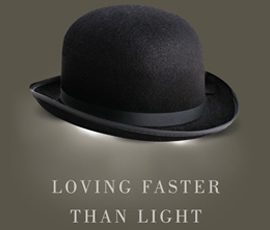
Book cover for 'Loving Faster than Light'
In the book Dr Price demonstrates how abstract science came to be entangled with class politics, new media technology, changing sex relations, crime, cinematography and cricket in the British imagination.
Blending literary analysis with insights from the history of science, "Loving Faster than Light” reveals how cultural meanings for Einstein's relativity were negotiated in newspapers with differing political agendas, popular science magazines, pulp fiction adventure and romance stories, detective plots, and esoteric love poetry.
Dr Price said: “Einstein’s theories were made public at a time of upheaval in Britain, and relativity quickly became a rich cultural resource with many uses in everyday conversation and imagination. Media coverage was especially inventive, as serious attempts to evaluate Einstein's theories jostled with jokes and satires about relativistic railway budgets and revolution. Science communicators struggled to untangle science from fantasy, while popular authors set abstract science to work in the service of postwar optimism and mourning.”
Loving faster than Light: Romance and Readers in Einstein’s Universe, published by the University of Chicago Press, is available now priced at $45 or £29.



